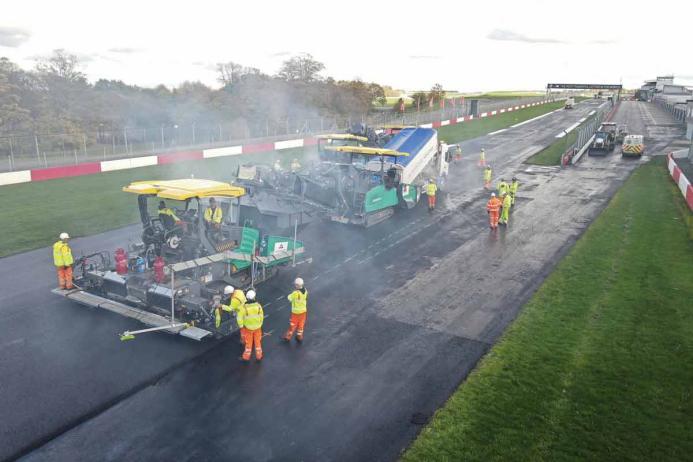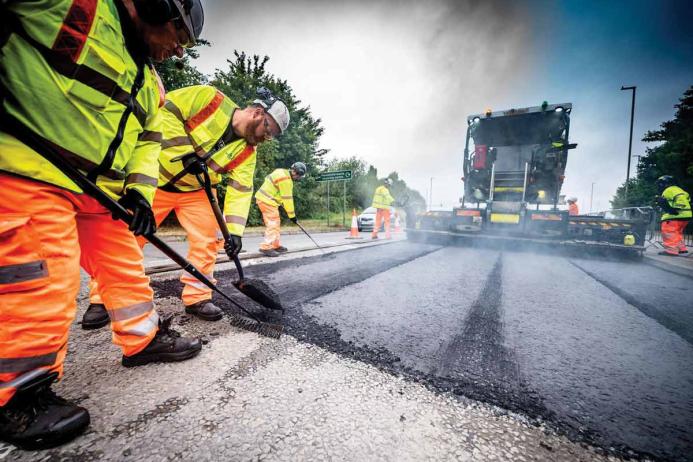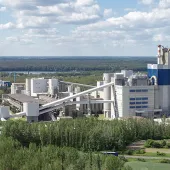On the Road to More Sustainable Materials

First published in the March 2024 issue of Quarry Management
In recent years, Aggregate Industries have invested heavily to innovate, develop, and supply a wider range of low-carbon construction materials. QM spoke to Victoria Smith, director of North and Midlands at AI’s Surfacing Solutions division, about its ongoing and relentless drive to minimize energy consumption, achieve major reductions in asphalt-related carbon emissions, and support the UK’s ambition of net-zero carbon emissions by 2050
As the country looks to decarbonize the economy, the way new buildings and infrastructure are being delivered will play a pivotal role in how the UK meets the Government’s ambitious carbon-reduction targets.
As it stands, the wider construction sector – which includes the road-building and transport infrastructure industry – continues to come under new pressure to reduce emissions and improve its sustainable working practices and environmental performance.
The impact of infrastructure on UK emissions, both direct and indirect, must be addressed if Britain is to successfully transition to a low-carbon, resilient, and circular society and meet the Government’s climate change commitment to bring all greenhouse gas emissions to net zero by 2050.
While reaching net zero remains a big challenge for the construction and aggregates sector, it is also presenting a huge opportunity for businesses to take on a leading role as major providers and installers of infrastructure solutions and to be in a position of great responsibility and influence to help deliver a low-carbon built environment of the future.
Aggregate Industries’ commitment to delivering low-carbon infrastructure is demonstrated through their longstanding environmental sustainability strategy – ‘Building Progress for a Sustainable Future’ – not to mention the company’s expanding portfolio of innovative and sustainable construction products, solutions, and services.
‘As an industry, we now have a massive opportunity for positive change by operating in the most sustainable manner and ensuring that the processes used to extract and manufacture products have the lowest environmental impacts as possible,’ said Victoria Smith, who has worked for Aggregate Industries (AI) for 18 years across their asphalt, concrete, and contracting divisions, and now leads the Surfacing Solutions team in the North and Midlands.
‘The risks of climate change need little introduction so we cannot miss the opportunity to act – and that action should encompass product/service innovation, delivering more circular driven practices, encouraging new ways of working, and promoting greater collaboration between clients, contractors, materials providers, and other suppliers.’
Indeed, extracting aggregates and manufacturing materials such as asphalt, concrete, and cement is extremely fossil fuel intensive. Among her key responsibilities, Ms Smith spearheads Surfacing Solutions’ efforts in minimizing energy consumption in the asphalt production process and reducing the carbon emissions in road infrastructure, by driving sustainable transformation, utilizing carbon-efficient technology, and developing more low-carbon products and solutions that can play a critical role in the construction industry’s decarbonization journey.
Aggregate Industries’ pragmatic approach to carbon management and sustainable construction is to follow the principles of the whole-life performance of a product – rather than just its embodied carbon footprint – ensuring that the impacts of a material, solution, or asset are minimized at every stage of its lifecycle (eg manufacture, construction, maintenance, end-of-life disposal etc).
‘As a leading sustainable business and key player in the market, we recognize the key role we have in promoting sustainable construction by optimizing our low-carbon products, their use, and whole-life performance,’ commented Ms Smith.
‘For our industry, carbon management and reduction need to be front and centre of executive decision-making and project planning. At Aggregate Industries, we strive to take a leadership position in the management of whole-life carbon, by measuring the carbon emissions of our production and products and setting new targets to reduce emissions at every stage of our operations.
‘Asphalt has a key role to play in our transition to net zero and effective energy management is integral to minimizing carbon emissions and driving efficiency. This includes looking at areas such as plant and equipment efficiency, the use of alternative fuels over fossil energy sources, and, of course, producing innovative low-carbon asphalt products.’
The Surfacing Solutions division of Aggregate Industries is always seeking the latest industry low-carbon technologies and best-practice approaches to supply quality, high-performance products, and innovative long-term sustainable solutions for the UK’s highways network. And perhaps nowhere is this more evident than in the company’s recent multi-million-pound investment in a brand-new, state-of-the-art asphalt plant at Cauldon Low in Staffordshire.
‘The Ammann production facility is a huge investment for Aggregate Industries and reflects our ethos of having the most modern, up-to-date, and efficient plant machinery to ensure our operations are as sustainable as possible,’ remarked Ms Smith.
With its future-proof capabilities, the new asphalt mixing plant will deliver a number of operational improvements at Cauldon Low, including lower-energy consumption, reduced carbon emissions, the capability for higher RAP contents, and the production of sustainable warm-mix asphalts. Ms Smith added that it was imperative for Surfacing Solutions to use a facility in line with AI’s ongoing policy of maintaining the health and safety and well-being of their employees.
‘As well as long-term sustainability, safety was also a major consideration in the design of the Ammann asphalt plant,’ she said. ‘People are at the heart of everything we do, so it was important that the new production facility provided quick, simple, and safe access for essential plant inspection and maintenance.
‘The modern plant is equipped with a full range of safety devices and the latest design offers more room on each level of the facility, meaning the ergonomics, access, and working areas promote the compliance of health and safety at all times. Operationally, the Ammann plant is of the highest quality in both design and build, and with its high capacity and flexibility, we are able to supply more effective, sustainable, and whole-life solutions to our highway improvement and reconstruction projects in the UK.’
Delivering low-carbon infrastructure
Accelerating the journey to net zero has never been higher on the construction industry agenda, and as one of the UK’s leading building materials suppliers, Aggregate Industries are fully committed to delivering innovative product solutions and services which prioritize sustainability – from addressing the environmental impacts across their operations to increasing the use of recycled waste as alternative raw materials.
For example, in 2022, the company (in partnership with Shell Bitumen) launched SuperLow-Carbon – the UK’s first-ever commercially available biogenic binder asphalt. The pioneering product uses Shell’s biogenic bitumen in a special formula, together with lower production temperatures to reduce its embodied carbon footprint.
The biogenic binder effectively locks CO2 within the asphalt rather than releasing it back into the atmosphere, creating a ‘carbon sink’ that absorbs and stores more carbon from the atmosphere than it releases.
‘SuperLow-Carbon has the potential to change the way the UK highways sector creates pavements,’ enthused Ms Smith. ‘We’re delighted with the result, which is a hard-working, sustainable, and low-carbon product that does not compromise on quality, performance, and durability.’
Wide-ranging collaboration across the value chain such as this will be pivotal in accelerating the pathway to a net-zero construction sector and improving the long-term sustainability and resilience of the UK transport infrastructure and highway network.

Another proud achievement for Ms Smith and her team was the resurfacing of the world-renowned Donington Park race circuit. The essential and extensive track maintenance works – which included the removal and replacement of more than 6,500 tonnes of asphalt – were completed over 22 days and represented the most significant improvement works at the venue in 20 years.
The collaborative project saw Aggregate Industries work closely with track-owners MotorSport Vision (MSV) and track designers Driven International, plus an extensive supply chain, to provide more than 5,000 tonnes of their specially formulated high-grip SuperPrixmat Ultra asphalt, designed exclusively for demanding high-performance motor racing circuits.
‘Supply chain collaboration is crucial in helping to tackle the global challenge of decarbonization,’ said Ms Smith. ‘Working together with both MSV and the wider supply chain required exacting levels of technical capability and advanced innovative solutions for this arguably meticulous and challenging resurfacing project at Donington Park. And we’re delighted with the end result – a bespoke solution that meets the durability requirements of one of the world’s most iconic racetracks.’
The construction and aggregates sector has been committed for many years to continuous improvement and innovation. Embracing newer low-carbon technologies and sustainable change, Aggregates Industries introduced their ‘Your Carbon Report’, which is said to be the industry’s first true ‘cradle-to-site’ measurement tool, allowing customers to see the embodied carbon impacts of their material choices quickly and with ease.
Giving customers a full picture to identify where carbon savings can be made along the value chain, construction/mineral products professionals using the tool can easily access and view exacting material carbon-emissions data for products manufactured by Aggregate Industries, thus allowing carbon-smart choices during design and procurement.
With the Government committed to producing net-zero greenhouse gases by 2050 under the 2008 Climate Change Act, delivering low-carbon, energy-efficient buildings and future-resilient infrastructure will be essential, and the aggregates and construction sectors will be instrumental partners in achieving this. For the construction value chain there will be growing pressure to reduce, if not eliminate environmental impact.

The commitment from AI is a great example of a forward-thinking and environmentally driven organization leading the way in sustainable construction and applying an increasingly eco-friendly approach to all business areas, from introducing new product innovations and ensuring responsible sourcing through to the company’s continued biodiversity efforts, alternative energy sources, and carbon-neutral logistics.
Ms Smith concluded: ‘The highways maintenance and road surfacing industry has already made significant progress towards the delivery of sustainable roads, but as key materials providers, we must continue the good work and develop the next product innovations and commercial solutions to help customers achieve real carbon savings and whole-life performance benefits, whilst contributing to the net-zero transformation of the construction sector.’
Subscribe to Quarry Management, the monthly journal for the mineral products industry, to read articles before they appear on Agg-Net.com








